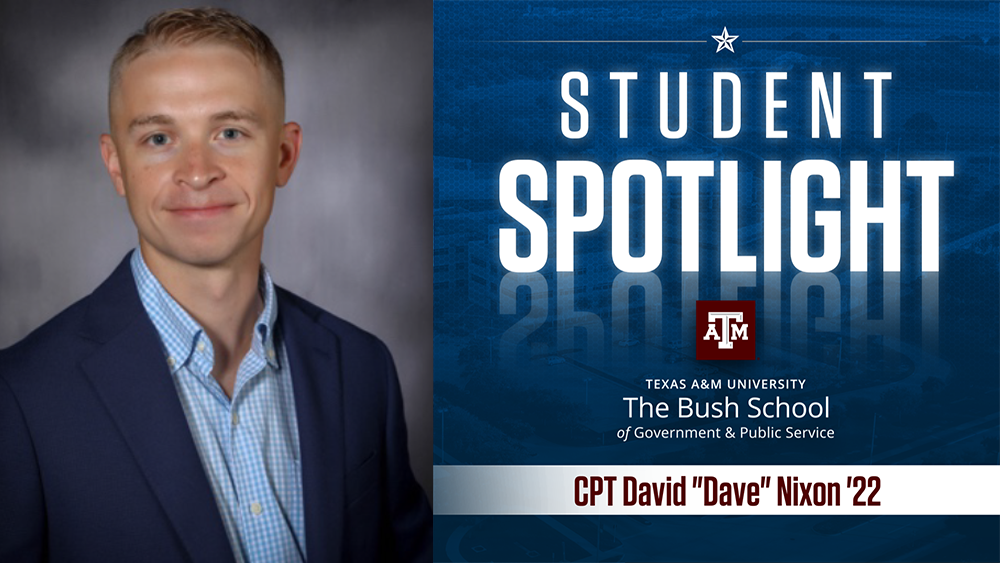
Learn more about why students have chosen the Bush School of Government & Public Service as David Nixon ’22, Master of International Affairs candidate, discusses his experience at the Bush School. Dave is in the National Security & Diplomacy track.
Introduce yourself.
My name is David Nixon. I’m a second-year student. I’m in the Master of International Affairs program, and my concentrations are grand strategy and China. Prior to coming to the Bush School, I served for 10 years as an active-duty Army officer. Upon graduation, I’ll return to the Army.
What are the top three things you appreciate most about the Bush School?
The faculty. There’s a great mixture of both academics and practitioners at the Bush School. We get a great perspective from the academics who’ve studied certain subjects for their entire careers. Then you add in the practitioners who’ve actually applied whatever foreign policy or domestic policy issues that have been theorized by the academics, and they can give their perspective of how it’s worked in the real world. When you mix those two, you come out with a great educational background that gives you a good view of the world, both from a theoretical side and a practical side.
My fellow students come from a variety of different backgrounds. A lot of them have come from undergrad. Some of them have practical experience like me. When you bring a very diverse group of people together that have different ways of thinking about things, different ways of looking at problems, you get a really good rich discussion. Everyone here is very willing to share their opinions and what they’ve learned. As a result, the class time that you spend with your classmates is in a very enriching discussion. Everyone leaves with a more holistic view of whatever problem you’re trying to solve.
The last thing I’ve enjoyed at the Bush School is that so many of the students are very passionate about public service. That’s what the namesake, President George H.W. Bush, wanted the school to be: a foundational learning ground for future public servants. It has absolutely lived up to that dream. We have such a high number of students that go into public service. Even the students that are here, many of them are just interested in giving back and helping people. I think that has been really inspiring and a very good thing for me to get to see in an academic setting.
What did you do this summer between your first and second years, and how did it supplements either your education or your continuing career?
I worked as an intern for the Bush Combat Development Complex, which is a Texas A&M program on the Rellis campus. Its focus is applied research into future technologies, specifically to have a Department of Defense application. It’s given me a different perspective—looking at a problem from a research side. Previously, all my experience has been looking at it from the application side. Getting to learn the problems and the process they go through to make those technologies work has been really interesting. It’s definitely something I’m taking forward that will give me a better look in the future—understanding how these technologies can help the United States deter future war.
What is a challenge that you’ve encountered?
Dealing with the COVID-19 pandemic. When we did our Interview Conference Weekend it was late February of 2020, and everything was normal. Then all of a sudden the world stops. When we showed up, all or most of our classes went to virtual, which was a different learning dynamic. It hurt the camaraderie that you would normally get from sitting in the same classroom with other students and being able to spend time with students outside of class. However, after as things continued to evolve, we were able to bring back the in-person activities to help supplement that education. You learn a lot from people inside the classroom, but you probably learn more from just sitting around and talking to people outside the classroom.
What advice would you give to first-years?
By the time you leave here, you should be an expert at something. It doesn’t matter what that something is–it could be a very niche piece of technology, a way of doing things or a region of the world. What you can gain here—talking to faculty, finding someone to mentor you, and then picking an area that you’re extremely interested in and becoming an expert in that area—will absolutely help you in spades. We have students here that are experts in underwater telecommunication cables, the Chinese economy, Taiwan, different regions all around the world, or a specific terror group. Those types of things will differentiate you, and then you’ll be value added to an organization. If you’re the smartest person in the room in a specific subject and you’re hired by a company, they will absolutely want you to be in the room. You’ll get to take part in a lot of different things at levels higher than you expected because you are the subject matter expert. Your employer will take advantage of that.

